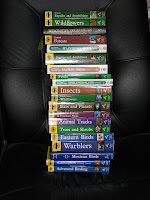On my first day of kindergarten my
Mom made me promise that I would go to college. As the story goes, my reply was “Ok, Mom,
but can I finish kindergarten first?”
I’ve been lucky to grow up with two very supportive parents, who pushed,
pulled, and cheered me through twelve years of private schooling, four years of
undergraduate school, fours years of graduate work for my M.S. and now are
helping me work through my PhD.
Education, for my parents, was
always a privilege. My Mom was told she
wasn’t bright enough to go to college, most of my Dad’s family expected nothing
of him. For their families, education
was not a priority. My parents proved
them wrong. My parents both went to
school and raised five kids, I was the “law school” baby, famously colicky the
night before Dad’s Bar exam. My Mom
finished her undergraduate degree at forty, and taught for a year just to prove
to herself that she could.
We ate dinner together every night,
debating and discussing politics, ethics, medicine, science, and poetry, always
with the “good book” –a very large dictionary – nearby. My parents worked hard to provide us with a
good education, spent many nights helping us with homework, and teaching us to
write as we worked on reports and essays for school. They always pushed us to get professional
degrees “Be a lawyer! Or a doctor!” and the house rule was that our family does
not turn in sloppy work, even if it meant staying up all night to perfect the
latest project.
My sister and I are both in
doctorate programs now; she’s in physics, I’m in ecology. My
younger brother is a talented musician who is working hard at producing his own
album and building a name for himself.
My parents are immensely proud and brag about us every chance they
get.
But. As beautiful as this story is, it has not
been easy for me, nor my sister. I have
struggled as a woman in the sciences.
I’ve dealt with sexual harassment, lacking support of my instructors,
discrimination at work, and a high level of competition from my classmates.
As a student, I’ve sat through
uncomfortable office hours, where my questions were met with smirks, struggling
to get my professor to focus on my face, and trying to ignore the occasional,
less then subtle innuendos -- and soon I began to bring a friend to office
hours with me.
Socially, being a scientist can be
difficult. Intelligence can be
intimidating to some men, and when your friends introduce you as the brilliant
scientist, people try to be interested, but their eyes glaze over after a
minute or two and eventually they wander off.
Working in the sciences, as an
academic, I’ve made a conscious effort to become part of the “’ol boys’ club” –
to do otherwise would be to miss out on essential networking, opportunities,
and conversation. Being in the club
usually means meeting for drinks, discussing current events, academic policies
and office politics, while also tolerating/ignoring/biting-your-tongue at the
comments about the “little ladies” at home, the attractive students in class,
or the new secretary’s well-fitted wardrobe.
While this gives me a strong advantage in my field, and will continue
to, I hope that in the future I’ll find a more inclusive environment, with colleagues
that are conscious of the degree of respect I deserve to encounter.

